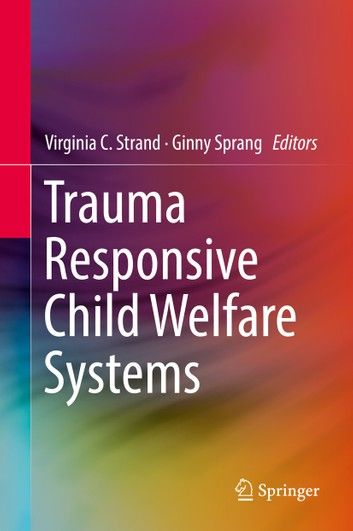| FindBook |
有 1 項符合
Trauma Responsive Child Welfare Systems的圖書 |
 |
Trauma Responsive Child Welfare Systems 作者:Strand 出版社:Springer Verlag 出版日期:2017-11-06 語言:英文 規格:精裝 / 349頁 / 23.4 x 15.5 x 2 cm / 普通級 |
| 圖書館借閱 |
| 國家圖書館 | 全國圖書書目資訊網 | 國立公共資訊圖書館 | 電子書服務平台 | MetaCat 跨館整合查詢 |
| 臺北市立圖書館 | 新北市立圖書館 | 基隆市公共圖書館 | 桃園市立圖書館 | 新竹縣公共圖書館 |
| 苗栗縣立圖書館 | 臺中市立圖書館 | 彰化縣公共圖書館 | 南投縣文化局 | 雲林縣公共圖書館 |
| 嘉義縣圖書館 | 臺南市立圖書館 | 高雄市立圖書館 | 屏東縣公共圖書館 | 宜蘭縣公共圖書館 |
| 花蓮縣文化局 | 臺東縣文化處 |
|
|
This comprehensive reference offers a robust framework for introducing and sustaining trauma-responsive services and culture in child welfare systems. Organized around concepts of safety, permanency, and well-being, chapters describe innovations in child protection, violence prevention, foster care, and adoption services to reduce immediate effects of trauma on children and improve long-term development and maturation. Foundations and interventions for practice include collaborations with families and community entities, cultural competency, trauma-responsive assessment and treatment, promoting trauma-informed parenting, and, when appropriate, working toward reunification of families. The book’s chapters on agency culture also address staffing, supervisory, and training issues, planning and implementation, and developing a competent, committed, and sturdy workforce.
Among the topics covered:
-
Trauma-informed family engagement with resistant clients.
-
Introducing evidence-based trauma treatment in preventive services.
-
Working with resource parents for trauma-informed foster care.
-
Use of implementation science principles in program development for sustainability.
-
Trauma informed and secondary traumatic stress informed organizational readiness assessments.
-
Caseworker training for trauma practice and building worker resiliency.
Trauma Responsive Child Welfare Systems ably assists psychology professionals of varied disciplines, social workers, and mental health professionals applying trauma theory and trauma-informed family engagement to clinical practice and/or research seeking to gain strategies for creating trauma-informed agency practice and agency culture. It also makes a worthwhile text for a child welfare training curriculum.
|











